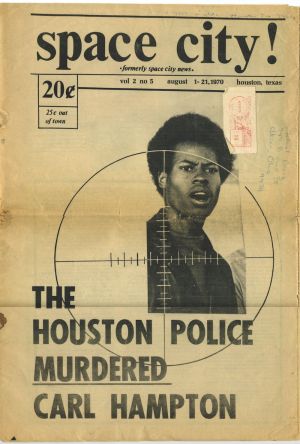Carl Hampton: Difference between revisions
Florez4747 (talk | contribs) No edit summary |
mNo edit summary |
||
| (One intermediate revision by one other user not shown) | |||
| Line 1: | Line 1: | ||
[[File:CarlHampton.jpg||thumb|right|]] | [[File:CarlHampton.jpg||thumb|right|]] | ||
<Blockquote>... On July 26 of [1970], Carl Hampton spoke to a crowd of about one hundred people. Although only twenty-one years old, Hampton had emerged as an important political force in the city's Black community. After a sojourn in Oakland, California, where he witnessed the Black Panther Party's efforts to "serve the people" through [[free breakfast programs for children]] and through patrols that monitored and challenged police misconduct, Hampton started the [[People's Party 2]] in Houston. He directed the group's efforts to feed and clothe poor people in the Third Ward from the party's headquarters in the 2800 block of Dowling... The material deprivation of Black people loomed large in | <Blockquote>... On July 26 of [1970], Carl Hampton spoke to a crowd of about one hundred people. Although only twenty-one years old, Hampton had emerged as an important political force in the city's Black community. After a sojourn in Oakland, California, where he witnessed the Black Panther Party's efforts to "serve the people" through [[Free Breakfast For Children|free breakfast programs for children]] and through patrols that monitored and challenged police misconduct, Hampton started the [[People's Party 2]] in Houston. He directed the group's efforts to feed and clothe poor people in the Third Ward from the party's headquarters in the 2800 block of Dowling... The material deprivation of Black people loomed large in shaping Hampton's politics. "If black people did not live in substandard housing, poor conditions, or suffer all the other unequal indignities," he declared, "there would be no [[People's Party 2]].<Ref>Ruth Thompson-Miller, How Racism Takes Place By George Lipsitz Temple University Press. 2008. 310 pages. $27.95, Social Forces, Volume 93, Issue 4, June 2015, Page 149, https://doi.org/10.1093/sf/sot021</Ref></Blockquote> | ||
= Sources = | = Sources = | ||
Latest revision as of 18:46, 24 June 2023
... On July 26 of [1970], Carl Hampton spoke to a crowd of about one hundred people. Although only twenty-one years old, Hampton had emerged as an important political force in the city's Black community. After a sojourn in Oakland, California, where he witnessed the Black Panther Party's efforts to "serve the people" through free breakfast programs for children and through patrols that monitored and challenged police misconduct, Hampton started the People's Party 2 in Houston. He directed the group's efforts to feed and clothe poor people in the Third Ward from the party's headquarters in the 2800 block of Dowling... The material deprivation of Black people loomed large in shaping Hampton's politics. "If black people did not live in substandard housing, poor conditions, or suffer all the other unequal indignities," he declared, "there would be no People's Party 2.[1]
Sources
- ↑ Ruth Thompson-Miller, How Racism Takes Place By George Lipsitz Temple University Press. 2008. 310 pages. $27.95, Social Forces, Volume 93, Issue 4, June 2015, Page 149, https://doi.org/10.1093/sf/sot021
